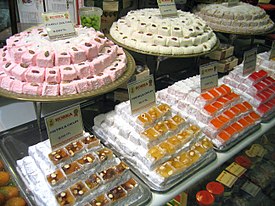Lokum

An assortment of Turkish delight
|
|
| Alternative names | Lokum |
|---|---|
| Course | Sweet |
| Place of origin | Ottoman Empire |
| Created by | Hacı Bekir Efendi |
| Serving temperature | Room temperature |
| Main ingredients | Starch, sugar |
| Variations | Multiple |
| |
|
Turkish delight, lokum or rahat lokum and many other transliterations (Ottoman Turkish: رَاحَة الْحُلْقُوم rāḥat al-ḥulqūm, Turkish: Lokum or rahat lokum, from colloquial Arabic: راحه الحلقوم rāḥat al-ḥalqūm) is a family of confections based on a gel of starch and sugar. Premium varieties consist largely of chopped dates, pistachios, and hazelnuts or walnuts bound by the gel; traditional varieties are mostly flavored with rosewater, mastic, Bergamot orange, or lemon. The confection is often packaged and eaten in small cubes dusted with icing sugar, copra, or powdered cream of tartar, to prevent clinging. Other common flavors include cinnamon and mint. In the production process, soapwort may be used as an emulsifying additive.
The exact origin of these sweets is yet to be definitively determined; however, "lokum" comes from the Arabic Halkum or Al-Halkum. In the Arab world, Turkish delights are called rāḥat al-ḥulqūm (رَاحَة الْحُلْقُوم) which means "Throat Comfort".
According to the Hacı Bekir company, the sweets as they are known today were developed by Bekir Efendi, named Hacı Bekir, after performing the Hajj. He moved to Istanbul from his hometown Kastamonu and opened his confectionery shop in the district of Bahçekapı in 1777. The company still operates under the founder's name.
...
Wikipedia
